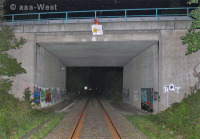A 25-car train half a kilometre long has just carried 1,250 tonnes of depleted uranium through the most densely populated region of Germany – destination unknown, presumably France.
The train left Germany’s only uranium enrichment plant at Gronau (52° 12', 160 km south of Hamburg) in the night from 27 to 28 April.
Usually trains from the German-Dutch-British-owned enrichment plant close to the city of Münster and the Dutch border have taken depleted uranium to Rotterdam for shipment to Russia, where it’s been dumped in the open air.
The Urenco company is extremely secretive about the transports. This time journalists were told by federal police that the train headed for Duisburg and on to France.
That would have taken the dangerous cargo through the densely populated Ruhr and Rhineland areas – if the police information is correct.
Anti-nuclear activists say they can only speculate what’s to be done with the uranium waste in France.
They expect it will be processed into uranium oxide in the Pierrelatte nuclear centre to make it easier to store. Construction of an interim storage for uranium oxide has been approved. Activists say it could be decades before the waste is returned to Germany.
Very close to Pierrelatte are four pressurised water reactors at Tricastin, where uranium was found in ground water last summer.
The train from Gronau was held up by two hours because a female French activist who lives in Germany, 27-year-old Cécile Lecomte, had abseiled over the tracks from a road overpass. She and other climbers have made such a name for themselves in disrupting nuclear transports that police now always have climbing specialists along on the trains to take the protesters down.
In January last year Lecomte held up a train for nearly seven hours by abseiling over its route. This most recent climbing action was her third in one and a half years on this non-electrified section of railway.
The protest a day after the Chernobyl anniversary got some public attention from a demonstration at Münster central station and near the abseiling overpass.
“The aim is to reveal the secret atomic transports from the Gronau uranium enrichment plant and to draw people’s attention to the policy of Urenco,” she writes. (http://de.indymedia.org/2009/04/248604.shtml)
“Urenco does not inform people about these transports and the dangers connected with them. On the contrary, people only get to hear about them when atomic power opponents manage to expose the departure of atomic transports by days of precise observation. It was first thought [the most recent] consignment was going to Russia.”
Lecomte writes that she means her action to be a signal against atomic policy in general and expansion of the Gronau enrichment plant in particular.
“Radioactivity knows no borders. What kind of an end to atomic power is it if Gronau is expanded, thereby supporting the construction of new nuclear plants - such as the EPR in Flamanville, France – by supplying the product to power stations all over the globe.
“The waste is carted right across Europe in secret transports. That is no solution to the nuclear waste problem. On the contrary, the population is exposed to ever more dangers, the environment is polluted ever more.
“Atomic installations need to be switched off immediately,” Lecomte writes.
Pictures of the abseiling at http://www.anti-atom-aktuell.de/fotos/2009-04-27_uranzugstopp-haeger/. More about Lecomte’s climbing protests at http://www.eichhoernchen.ouvaton.org/deutsch/anti-atom/Luftakrobatik-Atomtransporte.html .

